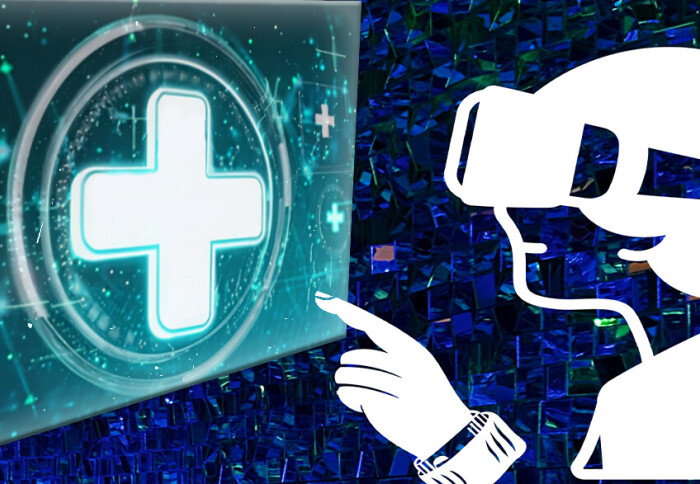Elevating healthcare education: Imperial introduces cutting-edge XR course

Imperial has launched a new online course on Extended Reality (XR) in Healthcare Education and Clinical Practice, now available on Coursera.
Amidst the array of pioneering innovations, Extended Reality (XR) has emerged as a potent force with the capability to reshape the healthcare education and clinical practice landscapes. Meeting the increasing need for targeted expertise in this domain, Imperial is proud to introduce an innovative new online course, "Extended Reality (XR) in Healthcare Education and Clinical Practice".
XR, or extended reality, is an umbrella term that encompasses virtual reality (VR), augmented reality (AR), and mixed reality (MR). These technologies offer a huge range of potential experiences - from augmented reality (AR), where you can overlay digital information onto the real world, to virtual reality (VR), where you can be completely immersed in a digital world.
The fundamental goal of this online course is to help people who are excited about XR make a real impact on medical education and clinical practices. By teaching essential concepts and sharing practical examples, learners will study how to leverage XR technologies to benefit healthcare education and clinical practice.
Mastering XR and its applications
 This XR in Healthcare course caters to a diverse audience, including healthcare professionals, students, clinicians, educators, and technical experts. Whether one seeks to enter the world of XR or is already involved in healthcare, this course promises to equip individuals with the knowledge and skills needed to leverage XR's potential effectively.
This XR in Healthcare course caters to a diverse audience, including healthcare professionals, students, clinicians, educators, and technical experts. Whether one seeks to enter the world of XR or is already involved in healthcare, this course promises to equip individuals with the knowledge and skills needed to leverage XR's potential effectively.
Upon completion of the course, participants will acquire essential knowledge and skills, including:
- Types of Extended Reality: Learners will differentiate between various XR technologies and identify their applicability in different use cases.
- Pedagogical Principles: Learners will explore evidence-based pedagogy, inclusivity, diversity, accessibility, evaluate best practices, and integrate these concepts into XR-led medical education.
- Clinical Application: Learners will identify suitable opportunities for XR implementation in clinical practice, enhancing patient care and outcomes.
- Collaborative Approach: Learners will understand the importance of multidisciplinary collaboration for successful XR integration in healthcare.
- XR Hardware and Software Selection: Learners will be able to select and justify the use of XR tools in both medical education and clinical settings.
Interdisciplinary expertise
 In the realm of education, collaboration often serves as the catalyst for innovation and knowledge dissemination. This principle underpins the creation of this new 4-week online course, which is designed to unravel the intricacies of XR's role in healthcare.
In the realm of education, collaboration often serves as the catalyst for innovation and knowledge dissemination. This principle underpins the creation of this new 4-week online course, which is designed to unravel the intricacies of XR's role in healthcare.
Through interdisciplinary collaboration, this course melds academic expertise, clinical insights, pedagogical wisdom, and technical finesse to create an enriching educational offering. Experts from diverse fields, including clinical practice, medicine, digital education, media, and technology, have shaped the content and design of this course.
By signing up for this course, learners will be given the opportunity to take advantage of Imperial's sector-leading knowledge on topics including:
- XR Clinical Expertise: Imperial's clinical academics, as well as external collaborators, share their XR insights through illuminating interviews and lectures.
- XR Pedagogical Expertise: The Interdisciplinary EdTech Lab (IETL) and medical educators contribute expert pedagogical insights through relevant readings and e-tivities, bolstered by interviews with clinical academics adept at incorporating XR in education.
- XR Development & Project Expertise: Project managers, XR consultants, and media experts lend their development acumen. This is complemented by the XR business case formative project.
This Imperial College course drew on contributions from a number of multidisciplinary experts and was co-created by an interdisciplinary team: the Department for Surgery & Cancer’s James Kinross and Jason Lawson; Sajan Patel from Imperial’s School of Medicine; the Interdisciplinary EdTech Lab and the Digital Media Lab.
Virtual and physical realities converge
 In a world where technical innovation is reshaping the way we learn and heal, the launch of Imperial's new online course on Extended Reality in Healthcare Education and Clinical Practice stands as a method of understanding and partaking in this transformation.
In a world where technical innovation is reshaping the way we learn and heal, the launch of Imperial's new online course on Extended Reality in Healthcare Education and Clinical Practice stands as a method of understanding and partaking in this transformation.
The course embraces a future where virtual and physical realities converge to redefine healthcare education and practice. Learners will be armed with knowledge and skills to distinguish XR’s various facets, integrate it into educational approaches, and harness XR’s potential for clinical advancement.
Imperial's commitment to interdisciplinary excellence has brought together experts from diverse fields, ensuring this course isn't just informative, but truly transformative. From sector-leading clinical academics who share their XR insights, to the dedicated educators shaping pedagogical principles and innovative minds behind XR development, this new course offers the opportunity and practical skills to harness the potential of extended reality technology.
Article text (excluding photos or graphics) © Imperial College London.
Photos and graphics subject to third party copyright used with permission or © Imperial College London.
Reporter
Benjie Coleman
Department of Surgery & Cancer